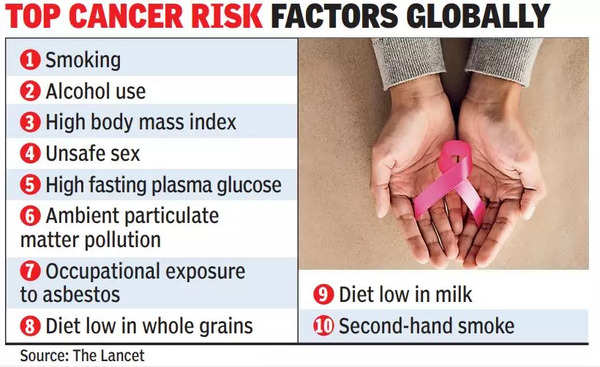[ad_1]
Globally 44.4% (4.5 million) of all cancer deaths were attributable to risk factors, says the study. The estimates are based on the Global Burden of Diseases, Injuries, and Risk factors Report, 2019.

According to the study, nearly half (50.6%) of all cancer deaths in men globally in 2019 (2.8 million) were due to known risk factors, compared with 36.3% all female cancer deaths (1.5 million) attributable to these factors.
Christopher Murray, director of the Institute for Health Metrics and Evaluation at the University of Washington’s School of Medicine and a co-senior author of the study, said, “Smoking continues to be the leading risk factor for cancer globally, with other substantial contributors to cancer burden varying.”
In the study, researchers investigated how 34 behavioural, metabolic, environmental and occupational risk factors contributed to deaths and ill health due to 23 cancer types in 2019. Changes in cancer burden between 2010 and 2019 due to the risk factors were also assessed.
They found that the leading risk factors globally for cancer deaths and ill health for both sexes were smoking, alcohol use and high BMI.
The leading cause of risk-attributable cancer death for both men and women globally were tracheal, bronchus and lung cancer, which accounted for 36.9% of all cancer deaths attributable to risk factors.
This was followed by colon and rectum cancer (13.3%), oesophageal cancer (9.7%), and stomach cancer (6.6%) in men and cervical cancer (17.9%), colon and rectum cancer (15.8%), and breast cancer (11%).
Between 2010 and 2019, cancer deaths due to risk factors rose by 20.4% globally, increasing from 3.7 million to 4.45 million. Ill health due to cancer increased by 16.8% over the same period, rising from 89.9 million to 105 million DALYs (Disability-Adjusted Life Years), the Lancet statement said. Metabolic risks accounted for the greatest increase in cancer deaths and ill health, with deaths increasing by 34.7% (6,43,000 deaths in 2010 to 865,000 in 2019) and DALYs by 33.3% (14.6 million in 2010 to 19.4 million in 2019), it added.
News Courtesy: timesofindia.indiatimes.com



